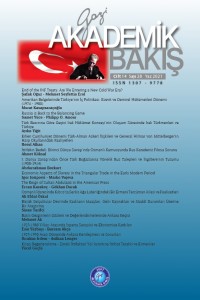Öz
Uygarlık tarihi kadar eski olan kölelik Erken Modern Dönemde Coğrafi Keşiflerle birlikte yaygınlaşmış, buna paralel olarak köle ticaretinde büyük artış yaşanmıştır. Orta ve Kuzey Amerika’daki yeni fethedilen toprakları mümkün olan en karlı şekilde kullanmanın yollarını arayan zamanın Avrupalı Sömürgeci Devletleri, bu bölgelerin ekonomik potansiyelini ortaya çıkarmak için köle emeğine dayalı plantasyon ekonomisini hayata geçirdiler. Ekonomik faaliyetlerdeki artışın işgücüne olan ihtiyacı arttırması, sömürgeci ülkeleri üç köşeli ticarete yöneltti. Afrika’dan Yeni Dünya’daki plantasyonlara getirilen kölelerin emekleriyle üretilen şeker, pamuk ve çivit gibi ürünler Avrupa’ya gelirken, kolonilerde kıt olan neredeyse tüm ürünler de Avrupa’dan ithal edildi. Bunun neticesinde sömürgeci ülkelerin büyük karlar elde ettiği bir yapı ortaya çıktı. Bir yandan da uluslararası ticaret gelişmeye başladı. Bu makalenin amacı, köle emeğinin ve plantasyon ekonomisinin üç köşeli uluslararası ticaretin verimliliği üzerindeki etkisini analiz etmektir.
Anahtar Kelimeler
Kölelik Üç Köşeli Ticaret Kolonileşme Yeni Dünya Orta ve Kuzey Amerika
Kaynakça
- BAILEY, Anne C., African Voices of the Atlantic Slave Trade: Beyond the Silence and the Shame. Boston: Beacon Press, Boston 2018.
- BAILEY, Ronald, ‘’The Slave(ry) Trade and the Development of Capitalism in the United States: The Textile Industry in New England’’, J. Inikori & S. Engerman (Eds.), The Atlantic Slave Trade, Effects in Economies, Societies and Peoples in Africa, the Americas and Europe, pp. 205-243, Duke University Press, London 1992.
- BENNET, Herman L., African Kings and Black Slaves, University of Pennsylvania Press, Philadelphia 2019.
- BENHERD, Stephen D., Conculsion, 2008, Retrieved January 16, 2021, from https://www.slavevoyages.org/voyage/essays#interpretation/seasonality-in-the-trans-atlantic-slave-trade/conclusion/8/en/
- BOODRY, Kathryn, ‘’August Belmont and the World the Slaves Made’’, S. Beckert & S. Rockman (Eds.), Slavery’s Capitalism: A New History of American Economic Development, pp. 163-178, University of Pennsylvania Press, Philadelphia 2016.
- BRAUDEL, Fernand, Igra razmjene; Materijalna civilizacija, ekonomija i kapitalizam od XV. do XVIII. Stoljeća, August Cesarec, Zagreb 1992.
- BRAUDEL, Fernand, Vrijeme svijeta; Materijalna civilizacije, ekonomija i kapitalizam od XV. do XVIII. Stoljeća, August Cesarec, Zagreb 1992.
- CLARENCE-SMITH, William – David Eltis, ‘’White servitude’’, D. Eltis (Ed.), The Cambridge World History of Slavery, AD 1420-AD 1804, V. 3, pp. 132-153, Cambridge University Press, New York 2011.
- CLARK, John, Christopher Columbus and the African Holokaust: Slavery and the Rise of European Capitalism, A & B Books, New York 1992.
- ELTIS, David, Economic Growth and the Ending of the Transatlantic Slave Trade, Oxford University Press, New York 1987.
- ELTIS, David, ”The African Side of the Trade”, 2007, Retrieved January 16, 2021, from https://www.slavevoyages.org/voyage/essays#interpretation/a-brief-overview-of-the-trans-atlantic-slave-trade/the-african-side-of-the-trade/5/en/
Öz
Slavery has existed since the beginning of human civilisation. However, there was a great upsurge in slavery during the early modern period and the Age of Discovery, when it gained enormous popularity and took new forms. The greatest European powers at the time conquered new territories in Central and North America, developing plans how to exploit them in the most profitable way possible. To unlock the economic potential of these territories, colonial countries
started organising a plantation economy by using slave labour. Consequently, colonial countries generated large profits, while the international trade began to flourish. Since there was a labour shortage due to an increased volume of economic activities, colonial countries engaged in the triangular trade, which ensured cheap and large workforce – slaves. As a result, slaves from Africa were brought to plantations in the New World, the most sought-after products, such as sugar, cotton and indigo, came to Europe from colonies, while almost all products that were scarce in colonies were imported from Europe. Therefore, the objective of this paper was to analyse the impact and costs of slave labour and plantation economy on the efficiency of the triangular international trade.
Anahtar Kelimeler
Slavery triangular trade colonialism New World North and Central America
Kaynakça
- BAILEY, Anne C., African Voices of the Atlantic Slave Trade: Beyond the Silence and the Shame. Boston: Beacon Press, Boston 2018.
- BAILEY, Ronald, ‘’The Slave(ry) Trade and the Development of Capitalism in the United States: The Textile Industry in New England’’, J. Inikori & S. Engerman (Eds.), The Atlantic Slave Trade, Effects in Economies, Societies and Peoples in Africa, the Americas and Europe, pp. 205-243, Duke University Press, London 1992.
- BENNET, Herman L., African Kings and Black Slaves, University of Pennsylvania Press, Philadelphia 2019.
- BENHERD, Stephen D., Conculsion, 2008, Retrieved January 16, 2021, from https://www.slavevoyages.org/voyage/essays#interpretation/seasonality-in-the-trans-atlantic-slave-trade/conclusion/8/en/
- BOODRY, Kathryn, ‘’August Belmont and the World the Slaves Made’’, S. Beckert & S. Rockman (Eds.), Slavery’s Capitalism: A New History of American Economic Development, pp. 163-178, University of Pennsylvania Press, Philadelphia 2016.
- BRAUDEL, Fernand, Igra razmjene; Materijalna civilizacija, ekonomija i kapitalizam od XV. do XVIII. Stoljeća, August Cesarec, Zagreb 1992.
- BRAUDEL, Fernand, Vrijeme svijeta; Materijalna civilizacije, ekonomija i kapitalizam od XV. do XVIII. Stoljeća, August Cesarec, Zagreb 1992.
- CLARENCE-SMITH, William – David Eltis, ‘’White servitude’’, D. Eltis (Ed.), The Cambridge World History of Slavery, AD 1420-AD 1804, V. 3, pp. 132-153, Cambridge University Press, New York 2011.
- CLARK, John, Christopher Columbus and the African Holokaust: Slavery and the Rise of European Capitalism, A & B Books, New York 1992.
- ELTIS, David, Economic Growth and the Ending of the Transatlantic Slave Trade, Oxford University Press, New York 1987.
- ELTIS, David, ”The African Side of the Trade”, 2007, Retrieved January 16, 2021, from https://www.slavevoyages.org/voyage/essays#interpretation/a-brief-overview-of-the-trans-atlantic-slave-trade/the-african-side-of-the-trade/5/en/
Ayrıntılar
| Birincil Dil | İngilizce |
|---|---|
| Bölüm | Makaleler |
| Yazarlar | |
| Yayımlanma Tarihi | 10 Haziran 2021 |
| Yayımlandığı Sayı | Yıl 2021 Cilt: 14 Sayı: 28 |
Kaynak Göster
Gazi Akademik Bakış Dergisi Creative Commons Atıf-GayriTicari 4.0 Uluslararası Lisansı ile lisanslanmıştır.


